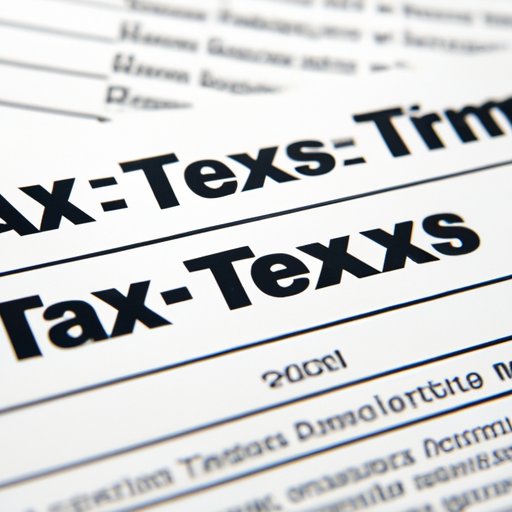
Introduction
It’s not uncommon to struggle with filing your taxes by the deadline. Whether it’s because of financial difficulties, personal circumstances, or simply a lack of time, many people find themselves in need of more time to file their taxes. The good news is that you can file for a tax extension to give yourself some breathing room. In this article, we will take a detailed look at how to file for a tax extension, the necessary forms and documents, important deadlines, common reasons for filing an extension, and some practical tips for making the process smooth and successful.
A Step-by-Step Guide
Filing for a tax extension is relatively easy, and the IRS allows individuals and businesses to request one for a variety of reasons. The process consists of a few simple steps:
Step 1: Obtain Form 4868. You can easily get Form 4868 from the IRS website or through your tax software. You will need to fill this form out to request an extension.
Step 2: Provide Required Information. The form will ask you to provide information such as your name, Social Security number, address, and estimated tax liability.
Step 3: Calculate Your Tax Liability. Calculate your estimated tax liability for the tax year. This is the amount you expect to owe the IRS, and it’s important to be as accurate as possible to avoid penalties and interest.
Step 4: Make a Payment. If you owe taxes, it’s important to make a payment with your extension request. This will help you avoid penalties and interest on late payments. There are several payment options available, such as direct debit, credit card, or check.
Step 5: Submit Your Form 4868. Finally, submit Form 4868 to the IRS either electronically or by paper. The IRS recommends submitting electronically for faster processing.
Top Reasons to File for an Extension
There are various reasons why someone might need to file for a tax extension. The most common reasons include:
To avoid late-filing penalties. If you don’t file your taxes by the deadline, you’ll face late-filing penalties that can add up quickly. By filing for an extension, you can avoid these penalties and buy yourself some extra time to prepare your taxes.
To gather more financial information. If you’re missing critical financial information that you need to file your taxes, you can request an extension to give yourself more time to gather the necessary details.
To avoid mistakes. Rushing to complete your taxes by the deadline can lead to mistakes that may result in penalties or even an audit. Filing for an extension gives you more time to review your tax documents and avoid errors.
Due to significant life changes. Life changes such as a new job, marriage, and divorce can cause significant disruptions that can affect your tax filing process. An extension can give you time to adjust and ensure that you file correctly.
Tips for Successful Filing
Filing for a tax extension doesn’t have to be a daunting task. By following a few practical tips, you can make the process much smoother and successful.
Stay organized. Create a tax-filing checklist to keep track of documents you’ve gathered, complete, and need to finish.
Don’t delay. Try to file for an extension as early as possible to ensure that the IRS has enough time to process your request. This will also give you ample time to prepare and file your taxes.
Be accurate. It’s crucial to provide accurate information on your extension request form to avoid penalties or rejections. Double-check your form for errors before submitting it to the IRS.
Make a partial payment. If you owe taxes, you can make a partial payment with your extension request to avoid penalties and interest on late payments.
Benefits of Filing Early
Filing your taxes early has several benefits that can save you both time and money.
Reduced stress. By filing early, you’ll avoid the last-minute rush of filing your taxes and all the anxiety that comes with it. You’ll have peace of mind knowing that your taxes are taken care of.
More time to prepare. Filing early gives you extra time to gather any necessary financial information, report changes, and get help if needed. The earlier you file, the more time you have to make changes as needed.
Maximize refunds or minimize payments. Filing early allows you to identify deductions or credits that may apply to your tax situation. This can help you maximize your refunds or minimize the amount you owe.
FAQs about Tax Extensions
Q: Who is eligible to file for a tax extension? A: Anyone can file for a tax extension, regardless of the reason. However, you must file your extension request by the tax filing deadline.
Q: How long is a tax extension? A: A personal tax extension will give you an additional six months to file, while business tax extensions vary depending on the type of entity and other factors.
Q: What happens if my extension is denied? A: If your extension is denied, you’ll need to file your taxes by the original deadline to avoid penalties. You may also owe interest on any unpaid taxes.
Conclusion
Filing for a tax extension is a smart move if you need more time to prepare your taxes. By following the step-by-step guide, understanding why you need a tax extension, and incorporating the tips for successful filing, you can make the process much easier and enjoy its benefits. If you need more information on filing for a tax extension, check out the IRS website or consult with a tax professional.





